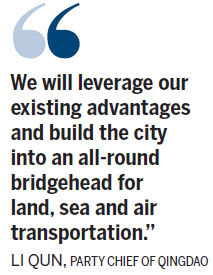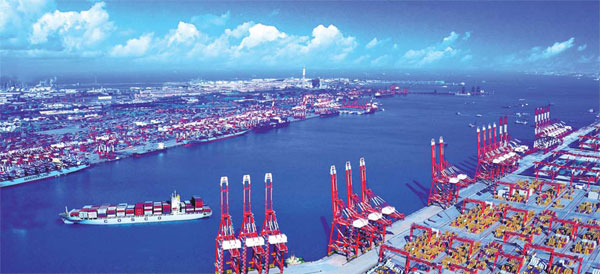Hub for modern Silk Roads
City positioned at the junction of two major trade initiatives
The eastern coastal city of Qingdao has well-developed plans to become a comprehensive hub city on the Silk Road Economic Belt and 21st-Century Maritime Silk Road proposed by the central government.
Known as "One Belt, One Road", the initiatives aim to put vitality in business cooperation across a vast region spanning Europe, the Middle East, Southeast Asia and East Asia.
"As an open city sitting at the juncture of the global trade routes, we will leverage our existing advantages and build the city into an all-round bridgehead for land, sea and air transportation, and trade, as well as a center of maritime development in East Asia, and a comprehensive service base for the One Belt, One Road strategy," said Li Qun, Party chief of Qingdao.
The city has already made impressive achievements in international trade and investment by cooperating with countries along the two Silk Roads, Li said.
In the past 10 years, trade between Qingdao and Asian countries, East Europe and African countries has increased by 11.8 percent annually on average. Its outbound investment to One Belt, One Road regions has grown by 77.7 percent annually.
Last year, 68.7 percent of Qingdao's imports and exports came from trade with those regions, while outbound investment there accounted for 44.59 percent of the city's total.
Crude oil and petroleum products from Oman, Russia and the United Arab Emirates, natural rubber from Thailand, Malaysia and Indonesia, and frozen fish from Russia, are shipped to the city every day. Mechanical equipment, home appliances, electronics, textiles and apparel from Qingdao flow back.
At present, ongoing projects by Qingdao's businesses include a 200-hectare tourist project in Cambodia, a nickel mine and a power plant in Indonesia, and a number of factories and industrial parks in Vietnam, Pakistan and others countries.
The city also works with Singapore in a "public-private partnership" to foster development in infrastructure, the marine economy, finance, environmental protection, logistics and smart city operations, as well as other technology and service sectors.
A city famed for its shipping industry, Qingdao has a global network with routes linking with more than 700 ports in 180 countries and regions. Qingdao Port now ranks eighth in the world in cargo throughput.
In a bid to build a smooth transition between the land and maritime Silk Roads, city government plans call for continued improvement its airport and a faster customs clearance system at air and sea ports to facilitate trade with Japan, South Korea and other Asian countries.
The city's export processing zone and bonded port area have already implemented policies similar to free trade areas. Qingdao will continue to apply to the State Council for the right to develop a free trade area to facilitate international investment and trade.
With an aim to develop comprehensive services and support for the One Belt, One Road programs, Qingdao officials plan to further develop the city's marine-related public service system as well as centers for international marine information and big data.
Party chief Li said Qingdao will also enhance other services to facilitate the flow of capital and information among the Pan-Pacific region while broadening the city's international cooperation channels.
"Qingdao will seize the opportunity of the nation's financial reforms to make itself a pilot zone for wealth management through increasing international cooperation," said Li.
The reforms in international financial operations will also impetus to cross-border and re-export trade as well as modern services, Li added.
xiechuanjiao@chinadaily.com.cn

|
Qingdao Port handled 477 million tons of cargo in 2014, ranking sixth in China and eighth worldwide. Provided to China Daily |
(China Daily 03/06/2015 page12)















